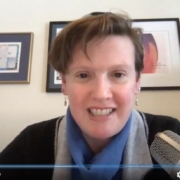A video teaching about “in-between” times and spiritual life
Dear Congregation Beth Israel members and friends,
In the wake of our community mission to Cuba, the rabbis who took part in that trip are now offering monthly video teachings at Bayit’s Builder’s Blog for Cuban Jewish communities and interested others. January is my month to offer a teaching. Since I’m not fluent in Spanish, I wrote my teaching and recorded a five-minute video in English. Rabbi Juan Mejia translated it into Spanish, so my video has Spanish subtitles.
Although the teaching was written with Cuban Jewish communities in mind, I realized after I recorded it that it’s universal and might be of interest to y’all too, so I’m sharing it here. Here’s a five minute video teaching — or, if you prefer, you can read the text of the teaching below in English. I hope it speaks to you.
Blessings to all —
Rabbi Rachel
[vimeo 383297974 w=640 h=360]Palabras del Torá / a “vort” of Torah – R’ Rachel Barenblat from Bayit: Building Jewish on Vimeo.
Shalom chaverim y buenos dias amigos! Last month we celebrated the festival of Chanukah. Next month will bring the holiday of Tu BiShvat, known as the “new year of the trees.” But January is an in-between month. One festival is over and the next has not yet arrived.
This pause between holidays is part of spiritual life too. Spiritual life isn’t only the peak experiences when communities come together for holidays or lifecycle celebrations. Of course those are part of spiritual life! But the quiet times, the in-between times, are also spiritual life.
Jewish life — all spiritual life — has a natural ebb and flow. In Hebrew, we say ratzo v’shov. Spiritual life ebbs and flows like the tide. High tide and low tide are both part of the natural rhythm of the sea. Peak times and quiet times are both part of the natural rhythm of spiritual life.
I love our festivals and the rituals that come with them. But I also love the quiet times. They remind me that I can find holiness and sustenance in small actions that are part of my every day. These small practices are among tradition’s tools for building meaningful Jewish lives.
And I think it’s important that some of these practices don’t require us to come to a special place, to use special items, or even to speak Hebrew. We are Jewish everywhere we go, not just at synagogue. We are Jewish no matter what language we use to speak or to pray.
Here are two of my favorite daily practices. There are texts and melodies that go with them, but I think the movement of the heart is the most important thing, more important than any special words or tunes. These are two of the most essential tools in my spiritual toolbox.
The first one is thanking God when I wake up. There’s a short traditional prayer for this purpose, called Modeh Ani. You can find it in most siddurim / prayerbooks: “I am thankful before You, living and enduring God. You have restored my soul to me; great is Your faithfulness!”
I love this prayer because it reminds me that being alive is a gift. And it reminds me that even if I feel like I made mistakes yesterday, God has faith that I can be my best self today. I love the idea that just as we seek to have faith in God, we can also believe that God has faith in us.
If you don’t know the traditional words, or if they don’t speak to you, you can do this practice with the words of your own heart. When you wake up in the morning, just pause and cultivate a sense of gratitude. Once this became a habit for me, it made my mornings feel brighter.
Saying the Shema before sleep is another spiritual tool for ordinary time. First we pause before bed, and reflect on the day. We resolve to do better tomorrow, and try to let go of the day’s hurts and mistakes — both mistakes we made ourselves, and mistakes made by others.
And then we say the Shema, a reminder of the Oneness of God and a reminder that we are part of the great unity of the universe. Doing this every night is a form of daily spiritual soul-maintenance. And I think it helps me fall asleep more easily, too. My heart feels lighter.
I love how these morning and evening practices bookend my day. They help me begin and end each day with a sense of connection. And they remind me that little things can add up to more than the sum of their parts. They take only a few minutes, but their impact is deep.
Months like this one, with no big holidays, come to teach us (and then to remind us) that all of life is spiritual life. Months like this one remind us that spiritual life is made up of simple everyday actions. Everything we do is part of spiritual life… or can be, if we pay attention.
And these small daily spiritual practices are some of our Jewish tools for helping us pay attention. They help us wake up: not just from literal sleep, but from spiritual sleep. With them we can build Jewish lives that are meaningful and deep: not only at holiday times, but always.






